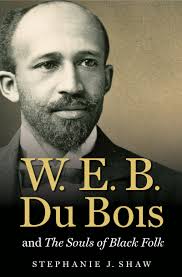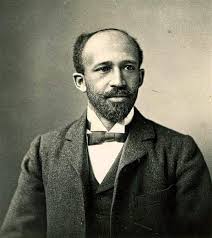The Souls of Black Folk Page #10
The Souls of Black Folk is a 1903 work of American literature by W. E. B. Du Bois. It is a seminal work in the history of sociology and a cornerstone of African-American literature. The book contains several essays on race, some of which the magazine Atlantic Monthly had previously published.
I have seen a land right merry with the sun, where children sing, and rolling hills lie like passioned women wanton with harvest. And there in the King’s Highways sat and sits a figure veiled and bowed, by which the traveller’s footsteps hasten as they go. On the tainted air broods fear. Three centuries’ thought has been the raising and unveiling of that bowed human heart, and now behold a century new for the duty and the deed. The problem of the Twentieth Century is the problem of the color-line. III. Of Mr. Booker T. Washington and Others From birth till death enslaved; in word, in deed, unmanned! ****** Hereditary bondsmen! Know ye not Who would be free themselves must strike the blow? BYRON. Easily the most striking thing in the history of the American Negro since 1876 is the ascendancy of Mr. Booker T. Washington. It began at the time when war memories and ideals were rapidly passing; a day of astonishing commercial development was dawning; a sense of doubt and hesitation overtook the freedmen’s sons,—then it was that his leading began. Mr. Washington came, with a simple definite programme, at the psychological moment when the nation was a little ashamed of having bestowed so much sentiment on Negroes, and was concentrating its energies on Dollars. His programme of industrial education, conciliation of the South, and submission and silence as to civil and political rights, was not wholly original; the Free Negroes from 1830 up to war-time had striven to build industrial schools, and the American Missionary Association had from the first taught various trades; and Price and others had sought a way of honorable alliance with the best of the Southerners. But Mr. Washington first indissolubly linked these things; he put enthusiasm, unlimited energy, and perfect faith into his programme, and changed it from a by-path into a veritable Way of Life. And the tale of the methods by which he did this is a fascinating study of human life. It startled the nation to hear a Negro advocating such a programme after many decades of bitter complaint; it startled and won the applause of the South, it interested and won the admiration of the North; and after a confused murmur of protest, it silenced if it did not convert the Negroes themselves. To gain the sympathy and cooperation of the various elements comprising the white South was Mr. Washington’s first task; and this, at the time Tuskegee was founded, seemed, for a black man, well-nigh impossible. And yet ten years later it was done in the word spoken at Atlanta: “In all things purely social we can be as separate as the five fingers, and yet one as the hand in all things essential to mutual progress.” This “Atlanta Compromise” is by all odds the most notable thing in Mr. Washington’s career. The South interpreted it in different ways: the radicals received it as a complete surrender of the demand for civil and political equality; the conservatives, as a generously conceived working basis for mutual understanding. So both approved it, and to-day its author is certainly the most distinguished Southerner since Jefferson Davis, and the one with the largest personal following. Next to this achievement comes Mr. Washington’s work in gaining place and consideration in the North. Others less shrewd and tactful had formerly essayed to sit on these two stools and had fallen between them; but as Mr. Washington knew the heart of the South from birth and training, so by singular insight he intuitively grasped the spirit of the age which was dominating the North. And so thoroughly did he learn the speech and thought of triumphant commercialism, and the ideals of material prosperity, that the picture of a lone black boy poring over a French grammar amid the weeds and dirt of a neglected home soon seemed to him the acme of absurdities. One wonders what Socrates and St. Francis of Assisi would say to this. And yet this very singleness of vision and thorough oneness with his age is a mark of the successful man. It is as though Nature must needs make men narrow in order to give them force. So Mr. Washington’s cult has gained unquestioning followers, his work has wonderfully prospered, his friends are legion, and his enemies are confounded. To-day he stands as the one recognized spokesman of his ten million fellows, and one of the most notable figures in a nation of seventy millions. One hesitates, therefore, to criticise a life which, beginning with so little, has done so much. And yet the time is come when one may speak in all sincerity and utter courtesy of the mistakes and shortcomings of Mr. Washington’s career, as well as of his triumphs, without being thought captious or envious, and without forgetting that it is easier to do ill than well in the world. The criticism that has hitherto met Mr. Washington has not always been of this broad character. In the South especially has he had to walk warily to avoid the harshest judgments,—and naturally so, for he is dealing with the one subject of deepest sensitiveness to that section. Twice—once when at the Chicago celebration of the Spanish-American War he alluded to the color-prejudice that is “eating away the vitals of the South,” and once when he dined with President Roosevelt—has the resulting Southern criticism been violent enough to threaten seriously his popularity. In the North the feeling has several times forced itself into words, that Mr. Washington’s counsels of submission overlooked certain elements of true manhood, and that his educational programme was unnecessarily narrow. Usually, however, such criticism has not found open expression, although, too, the spiritual sons of the Abolitionists have not been prepared to acknowledge that the schools founded before Tuskegee, by men of broad ideals and self-sacrificing spirit, were wholly failures or worthy of ridicule. While, then, criticism has not failed to follow Mr. Washington, yet the prevailing public opinion of the land has been but too willing to deliver the solution of a wearisome problem into his hands, and say, “If that is all you and your race ask, take it.” Among his own people, however, Mr. Washington has encountered the strongest and most lasting opposition, amounting at times to bitterness, and even today continuing strong and insistent even though largely silenced in outward expression by the public opinion of the nation. Some of this opposition is, of course, mere envy; the disappointment of displaced demagogues and the spite of narrow minds. But aside from this, there is among educated and thoughtful colored men in all parts of the land a feeling of deep regret, sorrow, and apprehension at the wide currency and ascendancy which some of Mr. Washington’s theories have gained. These same men admire his sincerity of purpose, and are willing to forgive much to honest endeavor which is doing something worth the doing. They cooperate with Mr. Washington as far as they conscientiously can; and, indeed, it is no ordinary tribute to this man’s tact and power that, steering as he must between so many diverse interests and opinions, he so largely retains the respect of all.
Translation
Translate and read this book in other languages:
Select another language:
- - Select -
- 简体中文 (Chinese - Simplified)
- 繁體中文 (Chinese - Traditional)
- Español (Spanish)
- Esperanto (Esperanto)
- 日本語 (Japanese)
- Português (Portuguese)
- Deutsch (German)
- العربية (Arabic)
- Français (French)
- Русский (Russian)
- ಕನ್ನಡ (Kannada)
- 한국어 (Korean)
- עברית (Hebrew)
- Gaeilge (Irish)
- Українська (Ukrainian)
- اردو (Urdu)
- Magyar (Hungarian)
- मानक हिन्दी (Hindi)
- Indonesia (Indonesian)
- Italiano (Italian)
- தமிழ் (Tamil)
- Türkçe (Turkish)
- తెలుగు (Telugu)
- ภาษาไทย (Thai)
- Tiếng Việt (Vietnamese)
- Čeština (Czech)
- Polski (Polish)
- Bahasa Indonesia (Indonesian)
- Românește (Romanian)
- Nederlands (Dutch)
- Ελληνικά (Greek)
- Latinum (Latin)
- Svenska (Swedish)
- Dansk (Danish)
- Suomi (Finnish)
- فارسی (Persian)
- ייִדיש (Yiddish)
- հայերեն (Armenian)
- Norsk (Norwegian)
- English (English)
Citation
Use the citation below to add this book to your bibliography:
Style:MLAChicagoAPA
"The Souls of Black Folk Books." Literature.com. STANDS4 LLC, 2025. Web. 23 Feb. 2025. <https://www.literature.com/book/the_souls_of_black_folk_310>.








Discuss this The Souls of Black Folk book with the community:
Report Comment
We're doing our best to make sure our content is useful, accurate and safe.
If by any chance you spot an inappropriate comment while navigating through our website please use this form to let us know, and we'll take care of it shortly.
Attachment
You need to be logged in to favorite.
Log In